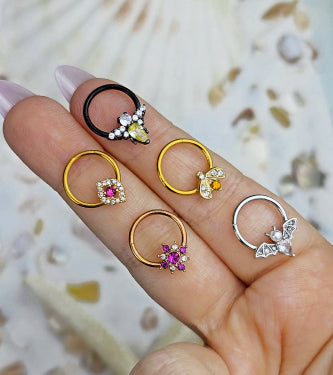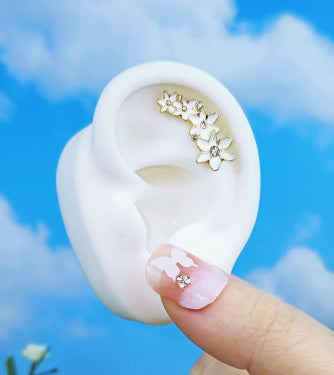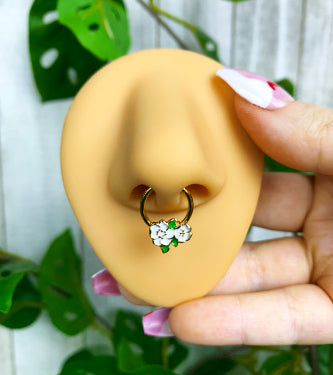Piercing & Material Sensitivities: What, How, & Why
So you finally got to change the jewelry on your new piercing only to wake up a day or two later to find your previously healed and happy piercing is itchy, red, oozing, and feels warm to the touch. Is it infected? Did you hit it on something? Or... Could it be something else? Before you blame yourself, take a moment to read this post. You may be the victim of a material allergy.
Material sensitivities are unfortunate and can really take the excitement out of a new body mod? Let us take the mystery out of it for you - Body Candy is here to give you the cold hard truth. Your safe and comfortable modified lifestyle is important to us, so we're going to explain what an allergy is; how to spot the signs; and what steps to take if you think you're experiencing a material allergy.
Disclaimer: Body Candy is only here to offer helpful suggestions for your piercing care.
No matter what, if you think you are experiencing a medical complication with your piercing, consult a medical professional AND your professional piercer ASAP.
Signs & Symptoms
Symptoms of a material allergy around a piercing may appear a lot like irritation or infection - swelling, redness, warmth, and/or feeling extremely itchy or burning. But an allergic reaction will have a few key symptoms that will distinguish it from either:
- The piercing may be weeping copious amounts of clear fluid
- There may be blisters
- The skin may be flaky or scaly, or you may see a visible rash
- The skin may appear to be actually pulling away from the jewelry
Also, unlike an infection, the symptoms will not respond to antibiotics at all. An allergic reaction severe enough to require medical attention will generally be treated with topical or oral steroids or with antihistamines. You may also see the same symptoms occurring on multiple piercings simultaneously. That should be a dead giveaway, particularly if the piercings are located on different body parts.
What Can I Wear Instead?
First and foremost - everybody's body is different. There isn't a perfect, catch-all answer for dealing with sensitivities, but Body Candy has a few suggestions with where to start! If you already have an allergy or are concerned about developing one, it doesn't mean you can't get a piercing or wear the jewelry you like. There are plenty of options!
If you are looking for a metal, 14kt solid yellow gold is a good place to start. This high quality metal should work for almost anyone - and Body Candy has an expert jeweler on staff that creates and hand-polishes these pieces for the highest quality results. You could also try out any of our G23 Implant Grade Titanium options.
For the most severely sensitive folks out there, Body Candy also carries a wide range of biocompatable jewelry in bioplast and flexible PTFE.
Body Candy even has jewelry made from organic materials like stone and glass and also synthetic materials like silicone. Just remember that silicone and organic materials are meant ONLY for healed piercings and stretches! Due to the porous nature of these materials, they can absorb bodily fluids from a healing stretch or piercing, which increases the chance of an infection.
More content below!
What does "hypoallergenic" mean?
First thing - the term "hypoallergenic" is a relative term and is commonly misunderstood. It means that the item contains a lower level of allergens, not that the item won't cause an allergic reaction. Even if an item is sold as "hypoallergenic," it doesn't necessarily mean that you won't experience an allergic reaction, so don't let that be the yardstick by which you judge body jewelry.
An allergic reaction of the skin is known as "contact dermatitis." In addition to the uncomfortable symptoms, there are several other risk factors to consider if you develop an allergy. Your body may become more sensitive the more it's exposed to the allergen. In other words, the more piercings you wear the allergy-inducing material in, the more likely you are to develop an allergy and the worse the allergy may become. Also, women are more likely to develop an allergy than men - sorry, ladies! You're also more likely to develop an allergy if you have a family history of them.
Finally, if you have concerns about whether or not you are allergic to any material, have your doctor perform a very simple patch test during your next visit. After all, forewarned is forearmed... Better to know the potential risks before you run into a problem!
From all of us here at Body Candy, happy piercing!
Written by: Alyssa Walter









